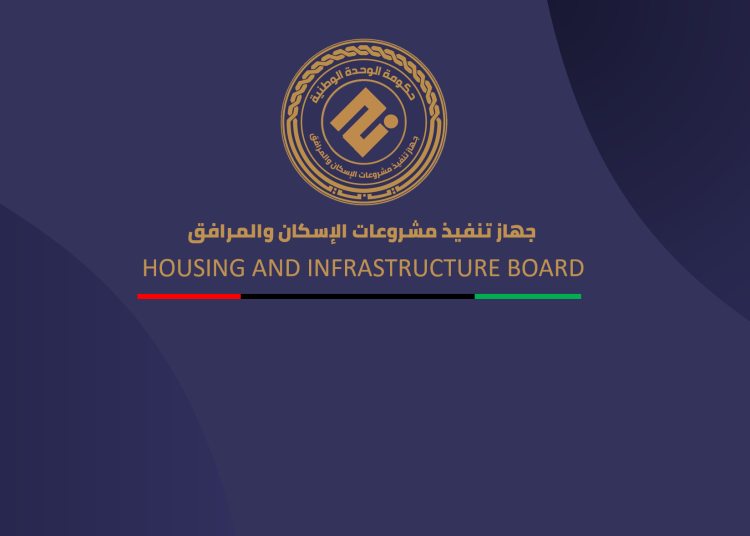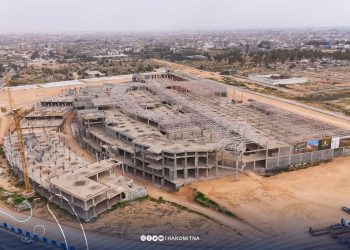The Director General of the state construction implementation Housing and Infrastructure Board (HIB), Mohamed Ben Ismail, revealed that the total contracted projects by HIB for 2025 amounted to 7,453 projects, distributed among 1,773 housing projects, 5,182 utility projects, and 498 water supply projects.
Ismail was giving a detailed technical power-point presentation in Tripoli yesterday during a visit to the HIB by Tripoli based Libyan Prime Minister Abd Alhamid Aldabaiba.
Aldabaiba was conducting a field visit to the HIB to follow up on the progress of work and to review the status of projects being implemented within his government’s “Return to Life” plan.
Implementation status of projects
In his presentation, Ben Ismail pointed to the implementation positions of these projects, explaining that there are 754 projects under implementation, while work has not yet started in 1,047 projects, while 1,575 projects have been stopped and 960 projects have been cancelled. He also pointed out that there are 2,177 completed projects without commitments, in addition to 940 completed projects that are still linked to existing commitments.
Recommendations
After reviewing the main obstacles to the operation of the HIB, Ben Ismail presented seven main recommendations:
1-Utilize the implementation of the previously implemented development programme with the need to review its priorities according to available resources.
2. Increase the financial allocations necessary to cover existing obligations in line with the size of the HIB’s contracts.
3-Ensure that the HIB completes the implementation of its previously contracted housing projects as investment projects outside the state’s general budget.
4-Issuing a decision to reconsider the allocation ratio of the Great Man-Made River water from the current situation, where 30% is allocated to urban uses and 70% to agricultural uses, to a new distribution where 40% is allocated to urban uses and 60% to agricultural uses, to cover the deficit of approximately 581,147 cubic meters per day.
5. Approval of the water plan (water supply projects) and provision of financial flows for the plan years 2024-2027 by the Council of Ministers.
6-Urging the National Urban Planning Authority to expedite the preparation and approval of unapproved plans adjacent to the master plans in major cities.
6. Completion of the inventory of expropriations and disbursement of compensation to citizens to remove obstacles and open routes in accordance with the approved plan.
7-Training and developing technical, financial, and administrative personnel to keep pace with developments in the field of projects.
Ben Ismail admitted that Libya’s housing construction projects need the involvement of the private sector and the banking sector too.
implementation of projects needs to be accelerated
For his part, Aldabaiba stressed the need to accelerate the implementation of strategic projects, especially sanitation projects, stressing the importance of accelerating work on housing projects because of their direct repercussions on social stability and economic growth. He also noted the remarkable progress in the implementation of public utility projects, especially water supply networks.
Aldabaiba said the government has set a list of priority and strategic projects. These are:
- The Tripoli Third Ring Road
- The National Programme for Wastewater Treatment
- Several key bridges
- The Hay Al-Andalous Corniche
- Several key water supply pipelines
End of free housing
Aldabaiba said that, except for a very small number of Libyans of low income, the inherited Qaddafi-era idea of the state providing free housing is over as it had exhausted state funds.
Part-subsidised housing initiative
However,he said the new initiative, financed by the Central Bank of Libya initiative, is for the state to pay for the land and the electricity, water and sanitation infrastructure and the building of shell of the house, which constitutes around 30 percent of a house, and for the owner of the house to be granted a loan/mortgage to complete the house at their own expense.
Libyan cadres and companies must be given opportunities in the sector
Aldabaiba said Libyan personnel and construction sector companies must be given an opportunity in the sector. Libyans and Libyan companies must be included in the implementation of projects by starting them off on the simplest projects and gradually and working upwards to the larger more complex projects. Foreign companies must allow Libyans to gain experience, he insited.
Aldabaiba also called for intensifying efforts in all regions of the country to achieve development justice and provide basic services to all citizens without discrimination.
The meeting was attended by the Minister of Transport and Financial Advisor to the Prime Minister, Mohammed Al-Shahoubi, the Acting Minister of Housing and Reconstruction, as well as the head of the Executive Team for the Prime Minister’s Initiatives and Strategic Projects, Mustafa Al-Mana.
.
150,000 housing units to be completed by 2030
It will be recalled that the Aldabaiba government, through its National Programme for Housing and Real Estate Development, plans development and commercial models for future projects aimed at implementing 150,000 housing units within its 2025-2030 plan.
The plan was revealed at the workshop held in Tripoli on 13 July entitled “The Role of the Banking Sector in Revitalizing Stalled Housing Projects and Urban Development” organised by the Central Bank of Libya in cooperation with the Tripoli based Libyan government.
The Central Bank of Libya house-construction finance initiative
Moreover, at the same workshop, the Go vernor of the Central Bank of Libya, Naji Issa, had announced an initiative to finance state house-building projects.
Issa said that LD 3 to 5 billion every year is not a large amount to be invested by the CBL in the construction of housing projects as a proportion of the total state budget or what is being spent on subsidized fuel annually.
This is especially the case in view of the positive effect on youth and Libyan society resulting from the increased availability of housing, he had added.
.
Aldabaiba reviews national house-building programme – with CBL financing initiative
Tripoli based Libyan government plans to complete 150,000 housing units by 2030
Aldabaiba government does increase spending on development projects: CBL
Libya to activate stalled housing projects through local companies
https://www.libyaherald.com/2018/10/11/cbl-not-delaying-economic-reforms-pcs-maetig/









